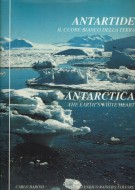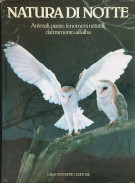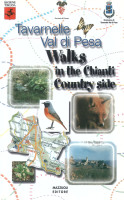Antartide Il cuore bianco della Terra Antarctica The Earth's white heart
| Autore/i | a cura di Carlo Baroni | ||
| Editore | Studio Enrico Rainero Editore | Luogo | Firenze |
| Anno | 1991 | Pagine | 208 |
| Dimensioni | 25x31 (cm) | Illustrazioni | ill. a colori e b/n n.t. - colors and b/w ills |
| Legatura | cart. edit. con sovracc. ill. colori - Hardcover with dustjacket | Conservazione | Usato ottime condizioni - used very good |
| Lingua | Italiano/Inglese - Italian/English text | Peso | 1800 (gr) |
| ISBN | 8885700187 | EAN-13 | 9788885700185 |
momentaneamente non disponibile
Esiste un territorio, all’interno di ognuno di noi,
che non appartiene al banale quotidiano.
E’ uno spazio, nascosto dentro la nostra anima,
dove confluiscono i nostri sogni e le nostre ricerche, assetate di conoscenza,
da dove nascono gli incubi primordiali e dove terminano i desideri.
Ci si arriva dopo un lungo viaggio attraverso un Oceano
che ci fa poco a poco dimenticare la vita normale.
Lo si sorvola come in un sogno,
dove la realtà sono le ombre bianche create dal bianco.
E’ uno spazio silenzioso,
dove bisbigliano i nostri dialoghi ideali con gli altri,
dove ci eleviamo e risolviamo interiormente
i conflitti della realtà che viviamo.
La nostra sopravvivenza è legata al saper riconoscere ed affrontare quello spazio primitivo,
al saperlo penetrare senza alterarne l’essenza,
al sapersi avvicinare alla meta nonostante le bufere di vento,
che portano ancora nel proprio sibilo il respiro di chi ci ha preceduto
ed attendono coloro che ci seguiranno.
Forse un giorno, se i governi arriveranno ad un tale livello di responsabilità, verrà deciso di mantenere intatti, come “Parchi Mondiali”, gestiti dalla Comunità Internazionale, quei territori nel mondo strategicamente vitali per la qualità della vita. La Comunità Scientifica Internazionale potrebbe così esprimere tutta la sua autorevolezza ed autonomia ed applicare i risultati delle proprie ricerche su concrete problematiche ambientali, finalmente non più gestite in modo emotivo e superficiale come spesso oggi succede. Il rimo esempio di questa extraterritorialità potrebbe essere l’Antartide, seguito, perché no, dalla Foresta Amazzonica, dalle aree polari settentrionali, dal deserto del Sahara, dagli ambienti marini…
Una decisione in apparenza meno vantaggiosa economicamente (e quindi politicamente) nell’immediato presente, ma più lungimirante nella prospettiva di un villaggio globale, contraddistinto dai vantaggio ed i malesseri sempre più condominiali
Each one of us possesses a hidden territory
That has little or nothing to do with our normal everyday lives.
It is a place that is deep within in our soul,
where our dreams and yearnings, thirsty for knowledge, are united,
where our earliest nightmares have their origin and where our desires come to rest.
We get there after a long long journey,
across an Ocean that little by little forces us to forget our normal lives.
We fly over it as if it were a dream,
where reality is only to be found in the white shadows
created by all that whiteness.
This is a space of silence,
where our ideal dialogues whisper together with others,
where we finally make up our minds to resolve the internal conflicts
that reality brings us every day.
Our survival is linked to being able to recognise and face up to that primitive space,
of knowing how to penetrate it
without altering its essence
and how to arrive at our destination in the teeth of a howling gale,
whose gusty screams still carry the breath of those who came before us,
and will still wait for those yet to come.
Perhaps one day, if governments arrive at a similar level of responsibility, a decision will be made to leave those territories in the world that are strategically vital for the quality of life untouched, and keep them as World Parks managed by the International Community. The International Scientific Community would thus be able to express all its authority and independence while applying the results of its research to concrete environmental problems, without being organized in an emotive and superficial way, as often happens today. The first park with this extraterritorial status could be the Antarctic, followed by, why not, the Forests of the Amazon, the area around the North Pole, the Sahara desert, the marine environments..
In all appearance, this decision would be less advantageous economically (and therefore politically) in the immediate present, but would be much more far-sighted in the prospect of a global village distinguished by the advantages and disadvantages that caome from a growing co-ownership.
Note alle condizioni del volume
Usato ottime condizioni, lievi segni di uso e del tempo. (T-CA)
Potrebbero interessarti anche...










